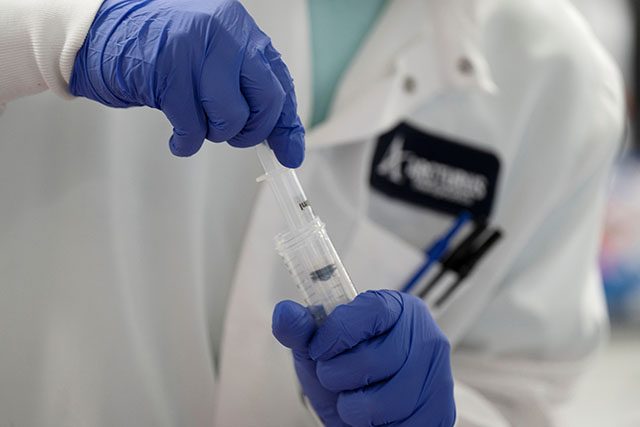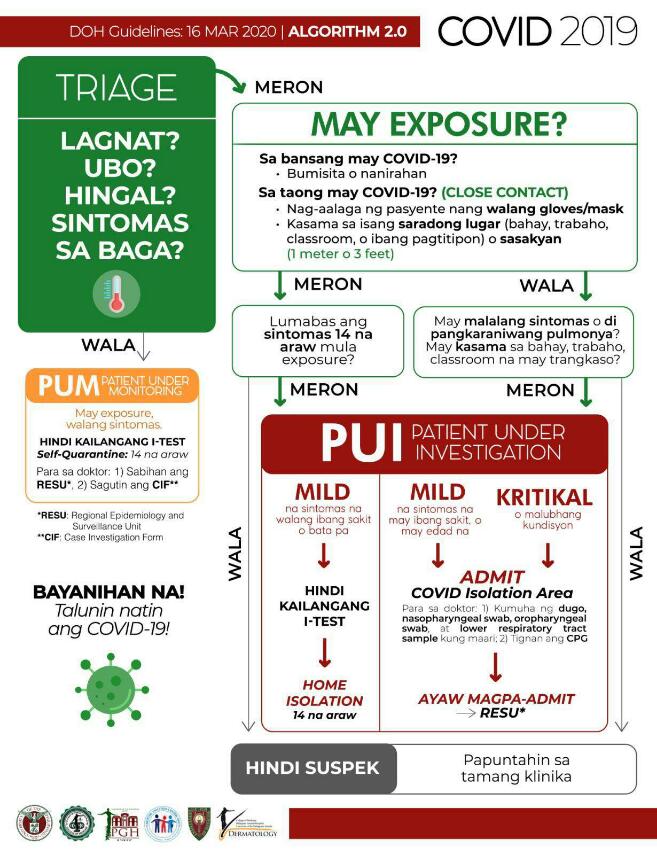
President Rodrigo Duterte‘s partner and his youngest daughter took swab tests to determine if they are infected with the novel coronavirus disease despite the limited number of test kits available in the country.
Honeylet Avanceña and Veronica “Kitty” Duterte were tested for COVID-19 in Davao, along with Paolo and Sebastian Duterte.
According to a report, the president’s family members were tested “even if they have yet to report symptoms of the disease… just to be sure.”
Previously, Davao City Mayor Sara Duterte-Carpio placed herself in quarantine after one of her staff was listed as a person under monitoring for possible COVID-19 infection.
Avanceña and Kitty’s samples were taken on Tuesday and will be sent to Manila.
When reports of their voluntary testing surfaced on social media, some Filipinos did not welcome the initiative.
A Twitter user claiming to be a physician from Zamboanga del Sur shared that they were only given “2 swabbing (not testing) kits” in the hospital she works in.
“Hello, I am a frontline physician in Zamboanga del Sur and we have a number of PUIs (persons under investigation) here and in my hospital we are only given 2 SWABBING (not testing) kits. We already used 1 leaving us with 1. PLEASE we are asking for provisions here. Our PUIs are SYMPTOMATIC po,” she replied in the report’s comments thread.
“If you can provide testing kits for VIP officials who are asymptomatic, then you most likely can provide for those PUIs who are symptomatic or have had history of travel. This goes against your protocols, @DOHgovph, how do you expect people to cooperate when the gov’t can’t deliver,” another online user wrote.
As of March 17, 6 p.m., Davao has one confirmed case, 61 persons under investigation and 2,398 persons under monitoring.
Duterte, who was not reported to be experiencing symptoms after a brief exposure to a confirmed COVID-19 patient, also had himself tested for the virus, which came out negative.
Other Filipinos also called out the testing of other public officials in contrast to a number of persons listed as under investigation who are actually showing symptoms of the virus.
A Twitter user claimed how a certain hospital in Benguet hasn’t been able to “discharge” its PUIs “until now” because the results of swab tests are still pending due to the supposed limited supply of test kits.
“Seventy specimens sent from Benguet Gen Hospital until now wala pa ring result dahil ang intindi namin wala gaanong test kits. Tapos magpaparepeat test kayo sa asymptomatic kesyo baka false positive,” he said.
“Utang na loob @DOHgovph mga ito ang unahin niyo kesa mga asymptomatic na mga pulitiko!” the online user added.
He was pertaining to Health Secretary Francisco Duque III‘s remark to Senate Majority Leader Juan Miguel Zubiri who tested positive for the virus despite being asymptomatic.
Duque said that his result may be a case of “false positive” and said that there tests which do not yield accurate results. He also mentioned that he wanted Zubiri to take the test again, if not only for the limited test kits.
Zubiri’s wife, who may or may not have been exposed to a patient, also got tested for the coronavirus, which came out negative.
Other officials who also tested for COVID-19 include Senators Sherwin Gatchalian and Nancy Binay, Finance Secretary Carlos Dominguez III, Transportation Secretary Arthur Tugade and Public Works Secretary Mark Villar.
Health Undersecretary Maria Rosario Vergeire explained that public officials were previously tested before the Department of Health had revised its “decision tool” determining who needs to get tested for the virus.
FACT CHECK: Did the old DOH decision tool qualify those without COVID-19 symptoms for testing?
Did they need to get tested?
DOH’s triage system is a guide to determine which people can avail a scarce resource—a testing kit—that will be spent by medical facilities.
The system only considers a person “under investigation” if he has symptoms associated with COVID-19.
It is also considered if the potential novel coronavirus patient traveled to another country with confirmed cases or has been in close contact with an infected individual.
Those “under monitoring” are individuals who have been exposed but do not show any symptoms common to the virus. They are advised to self-quarantine at home instead of undergoing testing.

‘Limited testing capacity’
Duque earlier said testing kits for COVID-19 are only limited.
The country only relies on testing kits donated by the World Health Organization and those developed by the University of the Philippines, which is significantly cheaper than its foreign counterparts.
The foreign test kits reportedly cost P8,500 per detection test while those produced by Filipino scientists only cost around P1,320.
Recently, reports of the government receiving test kits from different countries like South Korea and China have also surfaced.
Based on an ABS-CBN News report, the government received 2,000 test kits from the Asian giant and another 10,000 of it are expected to arrive this week.
South Korea also donated 500 test kits to the Philippines, with an additional 5,000 to 10,000 units set to arrive this week as well.
Duque previously said that the country’s mortality rate in light of COVID-19 is around eight percent because of our “limited testing capacity.”
“Hangga’t we do more massive testing, hindi natin malalaman kung ilan pa ang positibo,” he said in a press conference on Monday.
The WHO said that the best way to slow down the coronavirus pandemic is to ramp up the testing programs of each country so that all of the suspected cases can be detected at the earliest time possible.
WHO Director General Tedros Adhanom Ghebreyesus believes that the chain of infection will not be broken if those who are merely suspected cannot be tested.









